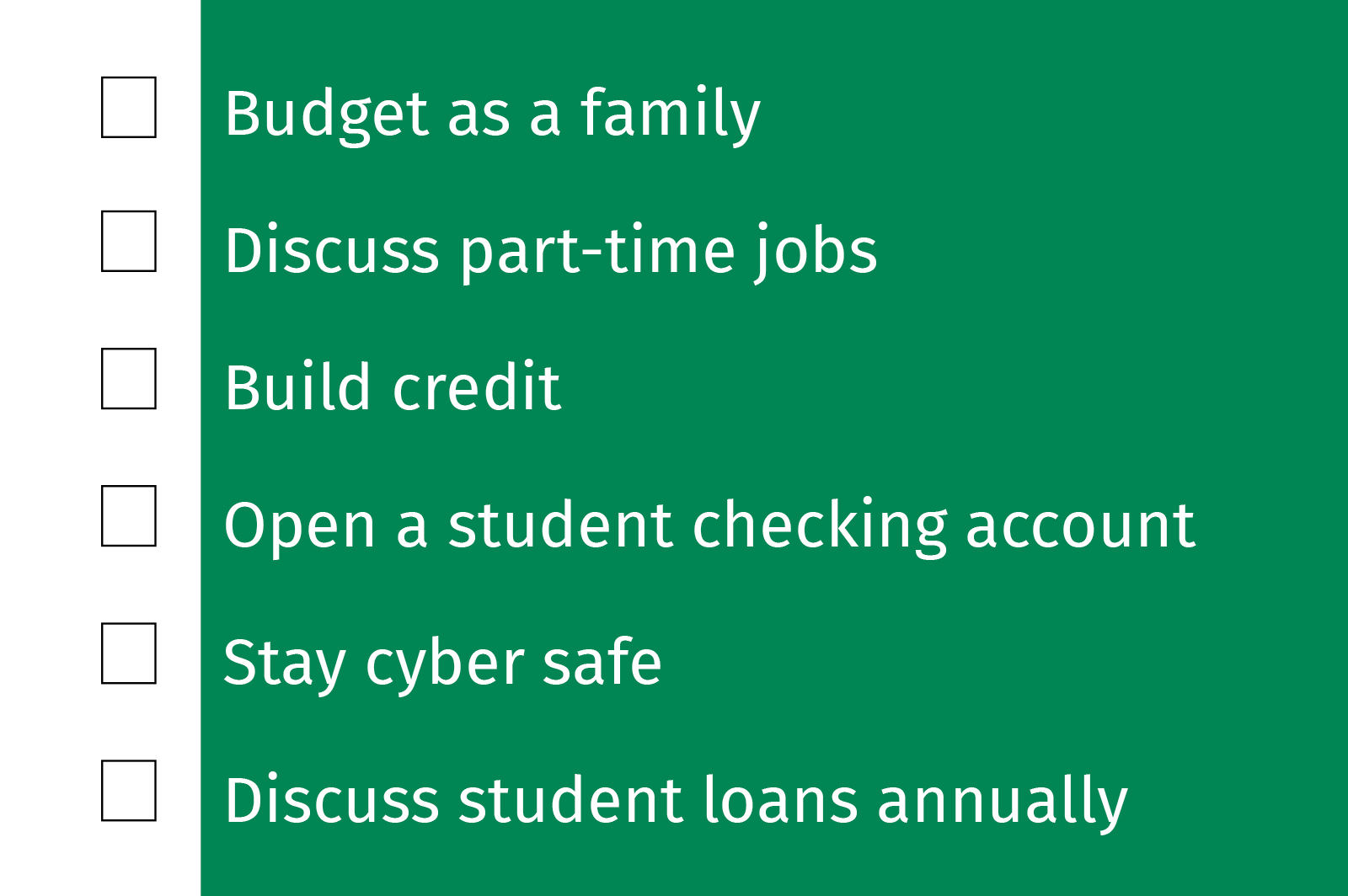A financial checklist for parents of a college bound teen

Key takeaways
- Using a budgeting tool can help your teen manage their monthly finances
- Discuss what items you'll cover and what they're responsible for
- Research student loans and scholarships annually
It must feel like yesterday that you were preparing your child for kindergarten - now they're ready to head off to college. Having your kids fly the nest is a milestone for parents, and one of mixed emotions. You might feel proud, fulfilled, concerned … all at once. Now that you've gone through the exciting process of helping your teen apply and be accepted to college, your thoughts will turn towards paying for tuition, room and board. Even if they will live at home and commute or take online courses, there's still tuition expenses, school supplies, food and more. Financial preparedness is one of the best things a parent can do to help their teen before they set foot on campus and move further into adulthood.
The summer before college is a golden opportunity to continue some of the money talks you've had throughout their lives. Only now, you're talking to a young adult who may be ready to take on more financial responsibility. (Yay!) Ensuring they're financially prepared is one of the best investments you can make in their future. To make things easy, here's a checklist of popular financial subjects you might want to cover with your teen.

Talk through budgeting strategies and tools
According to a recent student financial wellness survey by Trellis, the average college student would struggle to afford a sudden $500 expense. When asked how they would pay for the expense, students responded with turning to parents or other family members, selling their possessions, or even delaying bills (which could have negative implications on their credit). Examples of a sudden expense could include a car breaking down or needing an airline ticket home to attend a big family event like a wedding.
Even more worrisome was the mental load for these students, as financial concerns also impacted their studies. Forty-eight percent of respondents said they had trouble concentrating on schoolwork because of their financial situation. It's possible getting one's money in tip-top shape could make your teen feel more in control of their lives, so they can concentrate on what really matters - getting good grades for a bright future.
In addition, be sure to explain to your teen what expenses you will or will not be covering when they're in college. Tuition? Possibly, if that works for you. Takeout meals when you're already paying for dining hall food? That's a hard no.
While you've probably discussed budgeting with your teen before, one simple way to think of their finances is to divide a monthly budget into three buckets. It's a simple formula called the 50/30/20 rule. Here's how to break it down to them:
50% for necessities: Needs are those expenses that you absolutely must pay. These expenses can include rent, car payments, groceries, insurance, health care, credit card payments, student loans and utilities
30% for wants: These optional expenses should account for 30% of your child's budget. That spring break vacation to Aruba is a want, whereas paying for books or a laptop for class is a need. (Maybe the Aruba trip can be a graduation present in a few years!)
20% is for saving: While 20% of their money should be allocated for saving, your college student should also include an emergency fund. Opening a deposit account to save for a down payment, vacation or any other larger goal all fall within the savings category.
If your college student is tech savvy, they could try out a budgeting tool such as an online calculator or app.* Also, suggest starting an emergency fund, even if they only set aside a small amount each month until they graduate. The emergency fund money, no matter what amount, could be worked into their budget calculations.
Suggest a part-time job as one way to offset expenses
Encouraging your teen to work part-time, either on campus or off, could be a way for them to offset college loans and bills. While some students may not be ready to take on a job freshman year, others might see it as both financially smart and a way to socialize and meet new friends. Often restaurants, gyms, and small businesses surround college campuses - with many eager to hire college students on a part-time basis. When senior year of high school ends, this is a great time for your child to start researching options.
They should also keep in mind work-study. Work-study is a federally subsidized, need based, financial aid program. If eligible, it is awarded after you fill out the Free Application for Federal Student Aid (FAFSA), which needs to be submitted annually. There are different types of work-study programs, which provide part-time jobs so students can earn money while paying for education expenses. If your student qualifies for a federal work-study, they'll make at least the federal minimum wage. Types of work-study positions include tutoring other students and research positions. A work-study position can be located on or off campus. According to StudentAid.org, "If work is on campus, then it is usually doing a job on campus for the school. If work is off campus, the employer might be a private nonprofit organization or a public agency, and the work performed must be in the public interest."
Discuss building good credit
Establishing a positive credit rating is another way to help set your child up for future success. Once they're 18, they can apply for a credit card. Having good credit could help them with student loans and will act as a strong foundation for larger life goals such as buying a car or even a house someday. Either way, they will someday need to prove they are a reliable borrower who can be counted on to make payments. In addition, you may need to act as a cosigner.
And speaking of good credit, have you considered if they're ready for a credit card? You can open the discussion with your teen to include the importance of both using the card wisely, as well as choosing a card with cash-back options and possibly reinvesting the extra money. Keep in mind they should be careful to not choose a credit card that has fancy rewards options with lots of bells and whistles but which doesn't fit their lifestyle.
Help them get the right checking account
Many financial institutions offer student checking accounts that might benefit your teen. While students might already have the basics in place when it comes to banking, they may still be linked to your account. Opening their own student checking account will provide independence, as well as benefits for your teen such as allowing them to do every day financial transactions. Also look for no overdraft fees, no maintenance fees if you're under 25, and easy access to online and mobile banking. Banks are often rated online, so your teen should be sure to do their research, something they're probably already good at from all that homework!
Keep cyber safe with features such as notifications
Unfortunately, predators target students with scams of all sorts, ranging from emails and texts to phone calls demanding payment for a bill. They might also tell them they are signed up for a product they never even heard of. Brendan Goode, Chief Security Officer at Citizens, emphasizes the importance of safeguarding financial accounts against persistent threats from cybercriminals. Goode advises, "To protect your bank and other financial accounts, always use strong passwords and enable multi-factor authentication whenever possible. Longer passwords are more secure as they are more challenging for attackers to decipher." Additionally, Goode advises maintaining strong cyber hygiene by regularly updating your phone, utilizing a password manager, installing anti-virus software, and steering clear of public Wi-Fi networks.
Discuss student loans, financial aid and scholarships annually
As you consider college loans, you and your teen will want to start by filling out FAFSA forms. Be sure to pay attention to important deadlines. Explain that financial aid eligibility can change year to year and be adjusted if your family has experienced a change in financial status. Such changes could include one parent losing a job, a special needs child facing high-cost care, or more siblings entering college.
If your student still needs assistance, there are many scholarships that are worth researching. Check the U.S. Department of Labor's database, or even local organizations in your town such as the Rotary Club. Your employer might offer college scholarships you can share with your family. Try one of many online search tools, like College Raptor's free scholarship search that you can use to easily search vast databases of available scholarships.
Your teen might want to take an active role in their student loans. They could ask the financial aid office for an installment plan or inquire about state-based financial aid programs. Also, be sure to discuss private student loans, which could help fill the financial gap beyond scholarships and financial aid.
College bound, but economically savvy
By going over the topics here, your teen should be on the right track for college and beyond. Pat yourself on the back for a job well done. These are ongoing conversations, and by having these you've taken an important first step in ensuring your child has a bright future. As your child ages, they can explore our student banking options to ensure they have a checking account that meets their needs. Here's to a great school year for everyone!
Related topics

How to prep for college: HS Junior's Guide
Make sure you're tackling all the important college tasks so you're ready come next year when it's time to start filling out your college applications.

8 ways to pay for college
Check out this quick rundown of eight tried-and-true strategies for solving the "paying for college" puzzle geared toward your personal journey.

When to apply for private student loans
Learn about tuition due dates and how quickly you need to apply to make payments to your school's payment deadlines.
© Citizens Financial Group, Inc. All rights reserved. Citizens Bank, N.A. Member FDIC
* Wireless carrier, text, and/or data charges may apply.
Disclaimer: The information contained herein is for informational purposes only as a service to the public and is not legal advice or a substitute for legal counsel. You should do your own research and/or contact your own legal or tax advisor for assistance with questions you may have on the information contained herein.
